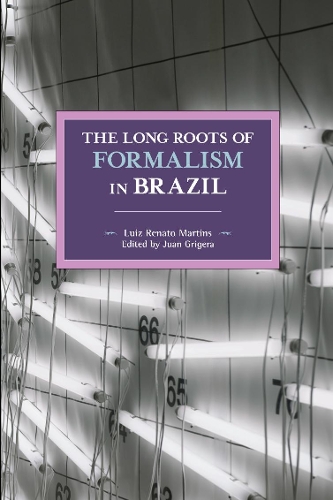
The Long Roots Of Formalism In Brazil
(Paperback)
Publishing Details
The Long Roots Of Formalism In Brazil
By (Author) Luiz Renato Martins
Edited by Juan Grigera
Haymarket Books
Haymarket Books
5th February 2019
United States
Classifications
General
Non Fiction
Popular culture
The arts: general topics
History of art
History of the Americas
709.81
Physical Properties
Paperback
323
Width 152mm, Height 229mm
Description
The present studies on Brazilian modern art seek to specify some of the dominant contradictions of capitalisms combined but uneven development as these appear from the global periphery. The grand project of Braslia is the main theme of the first two chapters, which treat the ideal city as a case study in the ways in which creative talent in Brazil has been made to serve in the reproduction of social iniquities whose origins can be traced back to the agrarian latifundia. Further chapters scrutinise the socio-historical basis of Brazilian art, and develop, against the grain of the most prominent art historical approaches to modern Brazilian culture, a critical approach to the distinctly Brazilian visual language of geometrical abstraction. The book contends that, from the fifties up to today, formalism in Brazil has expressed the hegemony of the market.
Reviews
"Martins deeply engaged and richly informed reflections on the particularities of the Brazilian situation analyse the vicissitudes of artistic and architectural modernism as it took shape in Brazil in the mid-twentieth century, and its subsequent replacement by an apolitical formalist aestheticism in the postmodern age of neoliberal capitalism."
Alex Potts, Max Loehr Collegiate Professor, University of Michigan
Author Bio
Luiz Renato Martinsteaches art history at the Visual Arts Department of the University of So Paulo, working also as a researcher associated to the Economical History postgraduate programme at USP. As a visitor, he lectured in Mexico, Chile, Argentina, Spain, France, UK and USA universities, and has published books and articles on modern art, film and the contemporary global crisiss issues.
Dr Juan Grigerais a British Academy Postdoctoral Fellow based at University College London Institute of Americas. His research focuses on the political economy of Latin America, particularly Brazil and Argentina and has been a visiting lecturer in Argentina, Brazil, Belgium and USA.
